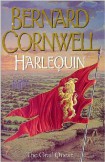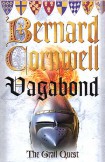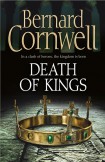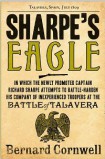1356: Bernard Cornwell discusses his latest book with Richard Lee
Richard Lee
Bernard Cornwell was one of the first members of the Historical Novel Society, and has been a fantastic support since the beginning. He has spoken for us twice at Kirby Hall, once in London, once in Albany, and will be our after dinner speaker at HNSLondon12. He has also written for us (Writing Your Bestseller) and become a Life Member of the society.
 1356 is his fiftieth novel, and tells a story against the backdrop of the Black Prince’s second chevauchee across France, ending with the great English victory at Poitiers. This novel sees the return of Thomas of Hookton, hero of the Grail Quest trilogy, and veteran of the battle of Crecy.
1356 is his fiftieth novel, and tells a story against the backdrop of the Black Prince’s second chevauchee across France, ending with the great English victory at Poitiers. This novel sees the return of Thomas of Hookton, hero of the Grail Quest trilogy, and veteran of the battle of Crecy.
For those unable to attend HNSLondon12, there are other chances to see Bernard on his UK book tour. He will be in Bath on Tuesday 2nd October (8 pm at St Swithins Church), and in London on Wednesday 3rd October (12.30 pm at Waterstones, London Wall), and again on Thursday 4th October (7.30 pm at Waterstones, London Piccadilly).
RL: It is 9 years since you last wrote about Thomas of Hookton. Has he changed at all in your mind? (The first (Harlequinn) predated the whole Da Vinci Code vogue, so it must be different now to be writing about secret societies and relics. Does that affect you?)
 BC: Really not at all. I must be careful here . . . let’s just say I never finished the Da Vinci Code, so it really couldn’t affect me! Is it different? Not to me . . . the driving force of the story is Thomas and he hasn’t changed a great deal; he’s older, more sure of himself, less naïve. He’s the bastard son of a priest so he’s sceptical of most religious claims, while not questioning the church’s basic premise.
BC: Really not at all. I must be careful here . . . let’s just say I never finished the Da Vinci Code, so it really couldn’t affect me! Is it different? Not to me . . . the driving force of the story is Thomas and he hasn’t changed a great deal; he’s older, more sure of himself, less naïve. He’s the bastard son of a priest so he’s sceptical of most religious claims, while not questioning the church’s basic premise.
RL: Thomas is your most ‘religious’ hero. How do approach the presentation of religion – and magic – in historical fiction? (We are a secular and largely sceptical readership now, but ALL serious people seem to have believed in religion and magic till relatively recently.)
BC: How do I approach it? I suppose like Thomas, being sceptical of the claims, though unlike Thomas I don’t believe in the basic premise either. Some reader accused me of putting too much religion in the original Thomas of Hookton books and all I could answer was that leaving religion out was like serving a gin and tonic without the gin. Religion pervaded their lives, simply because they lived in a pre-technological, pre-scientific society and there are no rational answers to the big questions – why did the river flood? Why did my child die? Why is there a plague? We know those answers now, or at least we know a hell of a lot more than Thomas did, so we should no longer need a supernatural answer.
 RL: Chevauchee is an extremely ugly form of warfare. What made you feel it would be a good backdrop to a series of ‘hero’ stories?
RL: Chevauchee is an extremely ugly form of warfare. What made you feel it would be a good backdrop to a series of ‘hero’ stories?
BC: The uglier the better! Because it makes a good backdrop, though that said, there’s not much of the chevauchee in 1356. It is there, though.
RL: 1356 is another of your books about Englishness – though with admirable characters of other nationalities. Isn’t it an English characteristic that we lose (graciously, modestly, sometimes heroically), and if so, will we ever see a Bernard Cornwell novel of a glorious failure?
Probably not, maybe? Don’t know. I write about the English (mostly) because I am English and was raised in England and have it deep in my bones. If I know any society well, it’s England, so it makes sense to write from that secure base. If I’d been born in France I’d doubtless be writing from the French point of view.
RL: 1356 is a complex narrative with many viewpoint characters. Is that a relief to write after the relentlessly 1st person viewpoint of your Uhtred books? What advantages do you find in the different styles?
 BC: It’s not a relief. It’s probably easier writing first person because it just flows, at least is does for me, but there are technical problems. A first person narrative can’t ready the reader for a surprise, by which I mean we can’t see the French laying an ambush for Sharpe if we can’t suddenly flip to their point of view, though there are (cumbersome) ways round that. When I’m writing first person I find myself writing the phrase ‘I later learned that . . .’ and have to find ways round that too. So plotting is much easier in the third person, but first person is probably more enjoyable to write.
BC: It’s not a relief. It’s probably easier writing first person because it just flows, at least is does for me, but there are technical problems. A first person narrative can’t ready the reader for a surprise, by which I mean we can’t see the French laying an ambush for Sharpe if we can’t suddenly flip to their point of view, though there are (cumbersome) ways round that. When I’m writing first person I find myself writing the phrase ‘I later learned that . . .’ and have to find ways round that too. So plotting is much easier in the third person, but first person is probably more enjoyable to write.
RL: I have read that George RR Martin was much influenced by your writing for his Game of Thrones series – and one could easily imagine 1356’s Labrouillade or Roland riding around Westeros. Why have you never been tempted to write the ‘pure story’ that is fantasy? And why do your books (unlike GRRM’s) always have heroes?
BC: George’s books have heroes! It’s just that he gets bored with them and casually (bravely) kills them off. I’ve never been tempted to write fantasy. George (and others) do it so well! I do have a love of history and we should write what we love? I’m flattered if I did influence George because his battle scenes are terrific, as is his characterisation, but I’m just more boring and like ‘real’ backgrounds.
 RL: I recently read Sharpe’s Eagle and Sharpe’s Gold (the first two published in that series) to my 8 year old. I glossed the rape scenes, but otherwise read straight – and he loved them as much as I did. Do you think there is a sense in which you write for our inner 8 year old – where the good guys get to win? (I should say that I would have had to leave out a great deal more of 1356!)
RL: I recently read Sharpe’s Eagle and Sharpe’s Gold (the first two published in that series) to my 8 year old. I glossed the rape scenes, but otherwise read straight – and he loved them as much as I did. Do you think there is a sense in which you write for our inner 8 year old – where the good guys get to win? (I should say that I would have had to leave out a great deal more of 1356!)
BC: I write for the inner 8 and 88 year old! Well, maybe not as young as 8, but I’m delighted he liked the books. And yes, I do write fantasy in the sense that the good guys win, but that’s an immemorial ingredient of story-telling. Jack does kill the giant. My good guys are sometimes (often) rogues, but they’re rogues on our side. Henry Thoreau famously said that most men (and women) ‘lead lives of quiet desperation’. We’re assailed by bosses, politicians, taxmen, officials, elf ‘n’ safety fascists, puritans, parents, lawyers and idiots and it’s often incredibly difficult to tell them to go to hell where they belong, but Sharpe does, and Uhtred does, so we can live our defiance through them. Give your son a couple of years and let him have the rape scenes?
RL: Do you live in a ‘Bernard bubble’, or are you aware of the changes in historical fiction over your writing life? If the latter, how do you regard those changes?

Bernard as Henry IV at the Monomoy Theatre (picture by Emily William’s, lifted from Bernard’s FB page)
BC: Until you asked me that question I had no idea there had been changes in historical fiction. Wow, I shall have to pay attention. Is it a Bernard bubble? Maybe? I write for myself before anyone else, meaning I write what I want to read, but there’s room for a lot else inside that bubble. I used to write two books a year, but seven years ago I fell among actors and so my summers now are spent in a theatre . . . long days of rehearsal and performance and that’s become an incredibly important part of my life. Sorry about the missing books, though . . . .
Many thanks to Bernard for generously answering my somewhat rambling questions. I very much look forward to continuing the conversation over dinner two weeks hence.






